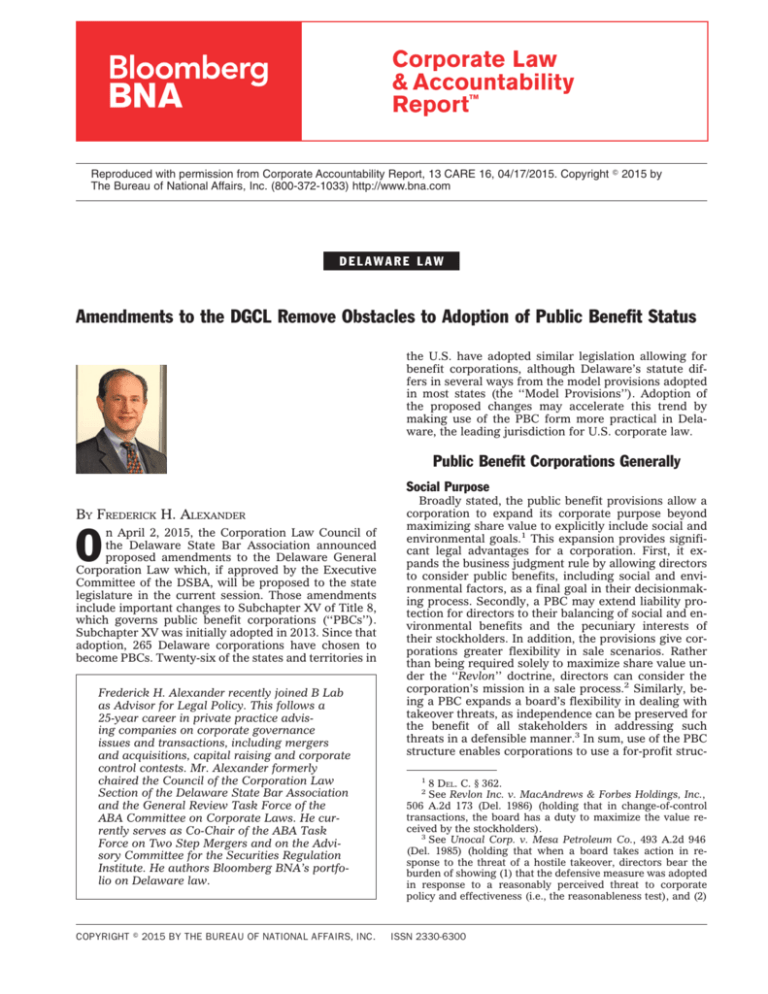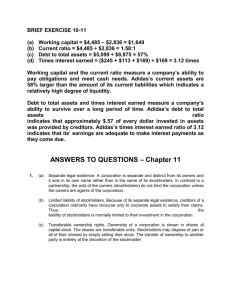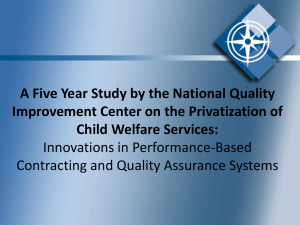Corporate Law & Accountability Report™
advertisement

Corporate Law & Accountability Report™ Reproduced with permission from Corporate Accountability Report, 13 CARE 16, 04/17/2015. Copyright 姝 2015 by The Bureau of National Affairs, Inc. (800-372-1033) http://www.bna.com DELAWARE LAW Amendments to the DGCL Remove Obstacles to Adoption of Public Benefit Status the U.S. have adopted similar legislation allowing for benefit corporations, although Delaware’s statute differs in several ways from the model provisions adopted in most states (the ‘‘Model Provisions’’). Adoption of the proposed changes may accelerate this trend by making use of the PBC form more practical in Delaware, the leading jurisdiction for U.S. corporate law. Public Benefit Corporations Generally Social Purpose BY FREDERICK H. ALEXANDER n April 2, 2015, the Corporation Law Council of the Delaware State Bar Association announced proposed amendments to the Delaware General Corporation Law which, if approved by the Executive Committee of the DSBA, will be proposed to the state legislature in the current session. Those amendments include important changes to Subchapter XV of Title 8, which governs public benefit corporations (‘‘PBCs’’). Subchapter XV was initially adopted in 2013. Since that adoption, 265 Delaware corporations have chosen to become PBCs. Twenty-six of the states and territories in O Frederick H. Alexander recently joined B Lab as Advisor for Legal Policy. This follows a 25-year career in private practice advising companies on corporate governance issues and transactions, including mergers and acquisitions, capital raising and corporate control contests. Mr. Alexander formerly chaired the Council of the Corporation Law Section of the Delaware State Bar Association and the General Review Task Force of the ABA Committee on Corporate Laws. He currently serves as Co-Chair of the ABA Task Force on Two Step Mergers and on the Advisory Committee for the Securities Regulation Institute. He authors Bloomberg BNA’s portfolio on Delaware law. COPYRIGHT 姝 2015 BY THE BUREAU OF NATIONAL AFFAIRS, INC. Broadly stated, the public benefit provisions allow a corporation to expand its corporate purpose beyond maximizing share value to explicitly include social and environmental goals.1 This expansion provides significant legal advantages for a corporation. First, it expands the business judgment rule by allowing directors to consider public benefits, including social and environmental factors, as a final goal in their decisionmaking process. Secondly, a PBC may extend liability protection for directors to their balancing of social and environmental benefits and the pecuniary interests of their stockholders. In addition, the provisions give corporations greater flexibility in sale scenarios. Rather than being required solely to maximize share value under the ‘‘Revlon’’ doctrine, directors can consider the corporation’s mission in a sale process.2 Similarly, being a PBC expands a board’s flexibility in dealing with takeover threats, as independence can be preserved for the benefit of all stakeholders in addressing such threats in a defensible manner.3 In sum, use of the PBC structure enables corporations to use a for-profit struc1 8 DEL. C. § 362. See Revlon Inc. v. MacAndrews & Forbes Holdings, Inc., 506 A.2d 173 (Del. 1986) (holding that in change-of-control transactions, the board has a duty to maximize the value received by the stockholders). 3 See Unocal Corp. v. Mesa Petroleum Co., 493 A.2d 946 (Del. 1985) (holding that when a board takes action in response to the threat of a hostile takeover, directors bear the burden of showing (1) that the defensive measure was adopted in response to a reasonably perceived threat to corporate policy and effectiveness (i.e., the reasonableness test), and (2) 2 ISSN 2330-6300 2 ture without being forced to sacrifice principles or mission. Stockholder Protections It is important to note that these benefits do not deprive stockholders of protection. They retain all of their rights, and the benefit provisions actually provide additional rights. First, stockholders in a PBC are entitled to receive a biennial report with respect to the public benefits.4 The report must include the board’s objectives with respect to the promotion of public benefits, the standards it uses to measure progress, objective factual information based on those standards and an assessment of the corporation’s success in meeting those objectives. This differs from the specifics of the report required for benefit corporations in states that have adopted the Model Provisions, which provide for an annual report based on a third party standard. However, a Delaware PBC may specifically provide in its charter for an annual, third party-based report.5 Secondly, stockholders can enforce the obligations of directors to balance various stakeholder interests. However, in order to avoid nuisance lawsuits, the statute requires that plaintiff stockholders satisfy a minimum ownership threshold of 2 percent, or, for publicly traded companies, the lesser of 2 percent of the shares or $2 million in market value.6 Generally, the charter can provide that such actions may only seek injunctive relief and not damages.7 Most importantly perhaps, stockholders retain all of their corporate governance rights, including the right to elect directors and vote on major corporate transactions. The Proposed Amendments As noted above, since the adoption of Delaware’s public benefit provisions, there has been significant interest in PBCs. A number of venture-backed companies have opted for benefit corporation status and there have been significant discussions with respect to the use of the form in the public markets. The proposed changes to the statute reflect the need to accommodate this significant movement. The Corporate Name The first change involves the naming requirements for PBCs. In order to protect investors, the original legislation required that the corporate name include a corporate identifier specific to the form: either ‘‘PBC’’ or ‘‘public benefit corporation.’’8 This raised issues in certain jurisdictions when a Delaware PBC filed as a foreign corporation. Some jurisdictions view the term as referring to nonprofit corporations. Other jurisdictions view the phrase ‘‘PBC’’ as insufficient to signal corporate identity. As a result, these jurisdictions appeared to require that a Delaware PBC file fictitious name certificates. Other corporations raised concerns about the costs incurred in a name change. In response to these concerns, the proposed amendment to DGCL § 362 prothat the defensive measure was reasonable in relation to the threat posed (i.e., the proportionality test)). 4 8 DEL. C. § 366(b). 5 8 DEL. C. § 366(c)(3). 6 8 DEL. C. § 367. 7 8 DEL. C. § 365(c). 8 8 DEL. C. § 362(c). 4-17-15 vides that a PBC can use the specific PBC identifier, but is not required to. However, there is a new requirement that privately held PBCs that do not use a PBC-specific identifier must inform buyers of stock that they are purchasing shares in a PBC. This, together with the requirement that stock certificates identify the company as a PBC,9 as well as a continued requirement that the charter identify the company as such,10 should give investors sufficient notice of the fact that the company in question is a PBC. Reduced Vote to Convert The original PBC legislation required a 90 percent vote to amend a corporation’s charter to provide that it was a benefit corporation or to effect a merger in which stockholders of a non-PBC receive stock in a PBC or benefit corporation. While this high vote was initially adopted to protect investors in corporations that were not PBCs, it severely limited the ability of corporations to use the form. The greatest concern was that the high vote would make it very difficult for PBC’s (or benefit corporations from any other jurisdiction) to use their own stock to effect acquisitions of Delaware corporations. Companies considering converting to a PBC or benefit corporation were reluctant to take on that burden if their business strategy contemplated acquisitions. Moreover, the high vote could limit the ability of non-PBC Delaware corporations to enter into transactions with PBCs or benefit corporations, even where the board and a very large majority of stockholders desired to enter into the transaction. In response to these concerns, the proposed legislation reduces the vote to twothirds of the voting shares. This vote is still higher than the simple majority vote required to approve a standard charter amendment or merger, and will give stockholders extra protection, while permitting companies to have confidence that they will be able to use their shares as acquisition currency if they become PBCs or benefit corporations. Similarly, the 90 percent hurdle was considered to be a nearly insurmountable obstacle to converting a public company into a PBC. The proposed amendments provide that stockholders will continue to be protected by a supermajority two-thirds vote in such a conversion. In addition, the fiduciary duties of the directors who approve the change will still require them to conclude that the conversion is in the best interests of the stockholders. Market Out for Appraisal Rights The original legislation created appraisal rights in any situation where stockholders in a corporation that was not a PBC received PBC or benefit corporation shares, either through a merger or a charter amendment. The proposed legislation creates a ‘‘market out,’’ which provides that appraisal rights will not be triggered as long as a stockholder has public company stock before the amendment or merger (and after a merger). This change mirrors the market out in DGCL § 262, Delaware’s appraisal statute generally applicable to mergers, which provides that there are no appraisal rights when there is a liquid market for the stock. 9 8 DEL. C. § 364. 8 DEL. C. § 362(a)(2). 10 COPYRIGHT 姝 2015 BY THE BUREAU OF NATIONAL AFFAIRS, INC. CARE ISSN 2330-6300 3 Conclusion Changes to the PBC provisions of the DGCL leave its structure largely in place, but amend provisions that practice had shown to raise significant obstacles to implementation. Going forward, entrepreneurs and in- CORPORATE LAW & ACCOUNTABILITY REPORT ISSN 2330-6300 vestors should have a greater level of comfort that they can obtain the advantages the PBC provisions offer, and both public and private corporations should have a clearer path to conversion. BNA 4-17-15






